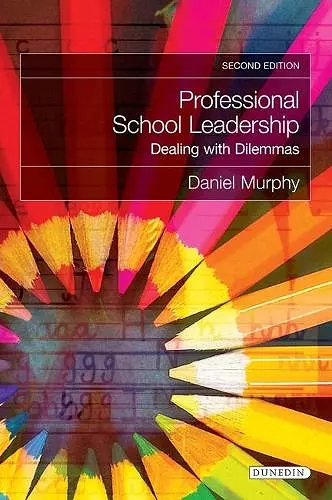Professional School Leadership
Dealing with Dilemmas
Format:Paperback
Publisher:Liverpool University Press
Published:13th Jun '13
Should be back in stock very soon

The ideal school leader is often portrayed heroically, as someone who is able to drive forward an agenda of change and improvement whatever the challenges. Yet the experience of school leadership is more complex. School leaders often find gaps between their aspirations and the tensions and moral uncertainties of the job, leading to high levels of personal and professional stress. These tensions arise between individuals and groups within plural school communities whilst the competing priorities set for the education system by its political masters are exacerbated by the competing values and interests found in our complex societies. In schools, this gives rise to specific and unavoidable dilemmas which affect individuals deeply, dilemmas which can occur on a daily basis.
Daniel Murphy uses this concept of dilemmas to rebalance our understanding of the work of school leaders. The perspectives of three disciplines, psychology, politics and ethics are brought to bear on the dilemmas; this perspective offers a fuller analysis of what is at stake. It provides those on leadership training programmes with a broad understanding of factor which contribute to the experience, as well as the aspiration, of leadership. The book also offers important insights into what the dilemmas tell us about the character of all public service in complex plural democracies. Such analysis is often a necessary first stage in facing up to difficult dilemmas. The book concludes with a toolkit which can be used by school leaders in such situations, together with some worked examples.
Dealing with Dilemmas has proved of considerable use to school leaders and those training for leadership roles in schools and education administration. Research reveals that these dilemmas are experienced by school leaders across the globe. In this substantially amended and enlarged new edition, updated information, new case studies (16 in all), research references and practical insights provide further assistance to school leaders and administrators who face these complex realities in their daily work.
'I found this book very interesting and inspiring and the additions to the first edition ensure that the concepts explored have received in-depth treatment, allowing the inclusion of a range of views and literature. School leaders, especially those finding themselves grappling with dilemmas, would find may useful insights here, but my concern relates to an observation made by Murphy himself. School leaders are more often reactive than reflective, due either to their perception or the pressures of their role. To gain the full benefit of the insights offered, they would need to take time to work through and reflect upon the theory and examples discussed in Part A. Used as part of leadership training this book provides rich and thought-provoking material to promote deep reflection within aspiring leaders.
The book makes a timely and useful contribution to the profession at a time when schools and school leaders face huge change and challenges.'
Educational Management Administration & Leadership
'Daniel Murphy’s book, “Professional School Leadership; Dealing with Dilemmas” is a timely and topical trip through some of the current challenges and how to analyse and work with them. Murphy speaks with authority born of considerable experience. An ex Head Teacher of two secondary schools in Scotland, he is now a Senior Teaching Fellow at MorayHouse School of Education, University of Edinburgh; well placed to provide a hands-on account to those students who will soon confront the issues outlined in his book.
Although Murphy writes from a Scottish context, many readers will be familiar with the distinctiveness of Scottish Education within the UK. In addition, the situations and problems he poses are likely to be universal. He sees an important step to understanding the dilemmas of leadership as being an ability to analyse the psychology, politics and ethics of different situations.
Much of this book is about how differently we, as human beings, interpret the world around us and how “different individuals frame dilemmas differently”. He makes the valid, yet obvious, point that in order to understand a dilemma, you must first of all understand your own emotions. The range of dilemmas now faced on a daily basis by Head Teachers is such that not knowing yourself, and failing to learn from these challenging situations, can only spell trouble.
He has a useful chapter on the social and political context of schools, their power and influence, while contrasting the increasing centralisation of governments with the need for school leaders to build “...relationships...to make sense of the arbitrary complexity of some aspects of modern living”.
The second section of the book deals with offering some practical guidance and it is here that new and aspiring school leaders may want to take note. Murphy provides his readers with that by now familiar concept, a user’s toolkit. He outlines what he refers to as the COPE process as a way of understanding and analysing action. There are, of course, plenty of such analytical tools around, but new head teachers and school leaders may find this approach of some use.
The book is compact (just 150 pages less references), easy to follow and understand. Murphy has included enough practical examples of everyday dilemmas and how to approach them to give new school leaders encouragement and direction. Even the older hands amongst us will find something useful in Daniel Murphy’s latest work.'
Scottish Educational Review
ISBN: 9781780460185
Dimensions: unknown
Weight: 331g
196 pages
2nd Revised edition